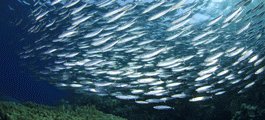Change in fishing rules 'has unintended consequences'
Study finds new regulations designed to improve fish stocks aren't working and might be depriving wildlife of food.
New rules banning fishermen from throwing away unwanted fish they've caught could harm wildlife and have failed to improve fish stocks, according to research at the University of Strathclyde.

The study, carried out by the Department of Mathematics & Statistics, suggests the reforms to the European Common Fisheries policy could be unintentionally damaging as discarded fish are food for a wide range of seabirds, marine mammals, seabed animals and other fish.
Researcher Dr Robin Cook said:
Our results highlight the importance of considering the broader ecosystem consequences of fishery management.
Inflating landing quotas to accommodate the entire catch is an inadequate solution with few conservation benefits. On the other hand, the effective reductions in harvest rates resulting from changes in fishing practices to eliminate the capture of unwanted fish can deliver conservation benefits, especially in heavily exploited systems.
What the research found
The team developed a computer similation model of the Noth Sea's ecosystem and used it to investiage the effects of changes in fishing pressure and the proportion of catches discarded at sea.
In contrast, changing fishing practices so unwanted fish are no longer captured had a dramatic effect on the model, with major benefits for birds, mammals, and fish stocks.
This could be done by 'improved selectivity', through the use of fishing gear designed to avoid unwanted catches and careful timing and location of fishing.
Both approaches led to reductions in waste of natural resources but had very different conservation benefits.
Informing public policy
The waste of living resources caused by discarding is now considered unacceptable.
This is why the EU has reformed its Common Fisheries policy in an effort to remove the practice, by making fishing vessels land all their catch.
The key issue for the policy is how far the landing obligation is compensated by an increase in quotas.
Our research shows full compensation, where quotas are raised by an amount equivalent to the quantity of fish currently discarded, cancels out any conservation benefits.
On the other hand, making improvements in selective fishing happen by offering no compensation has draatic conservation benefits, so there's a trade-off between what's practical and what's good for the envinronment.